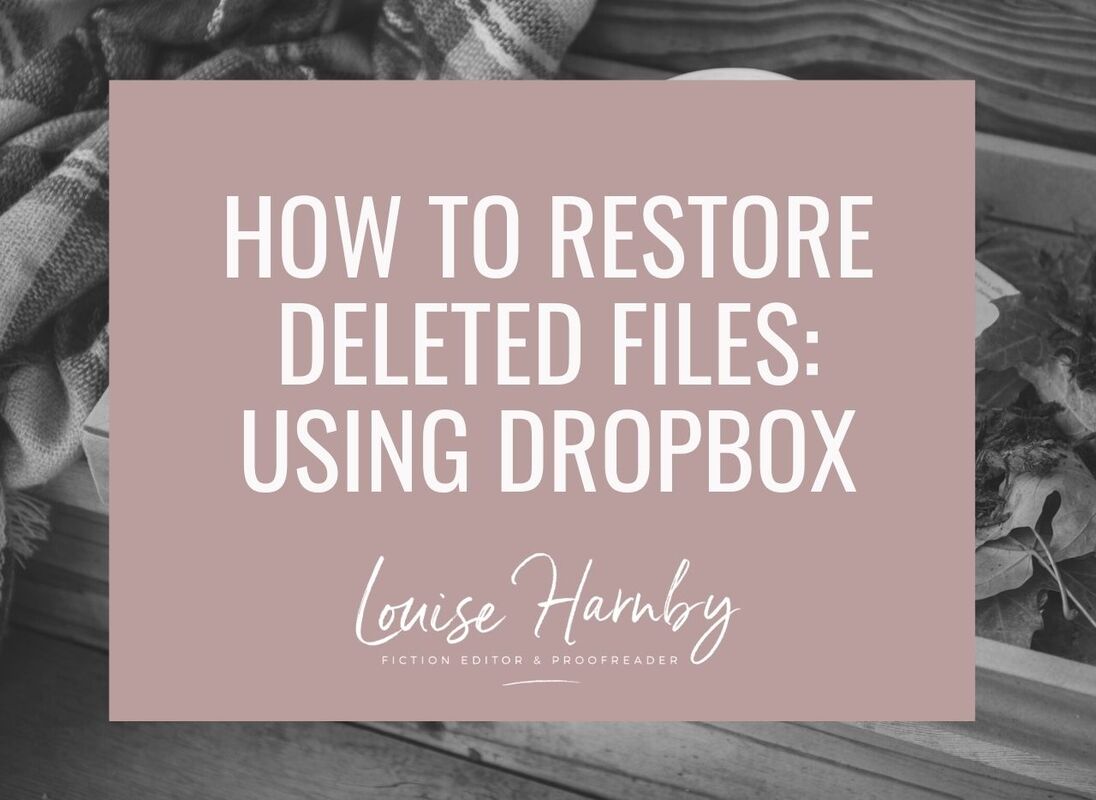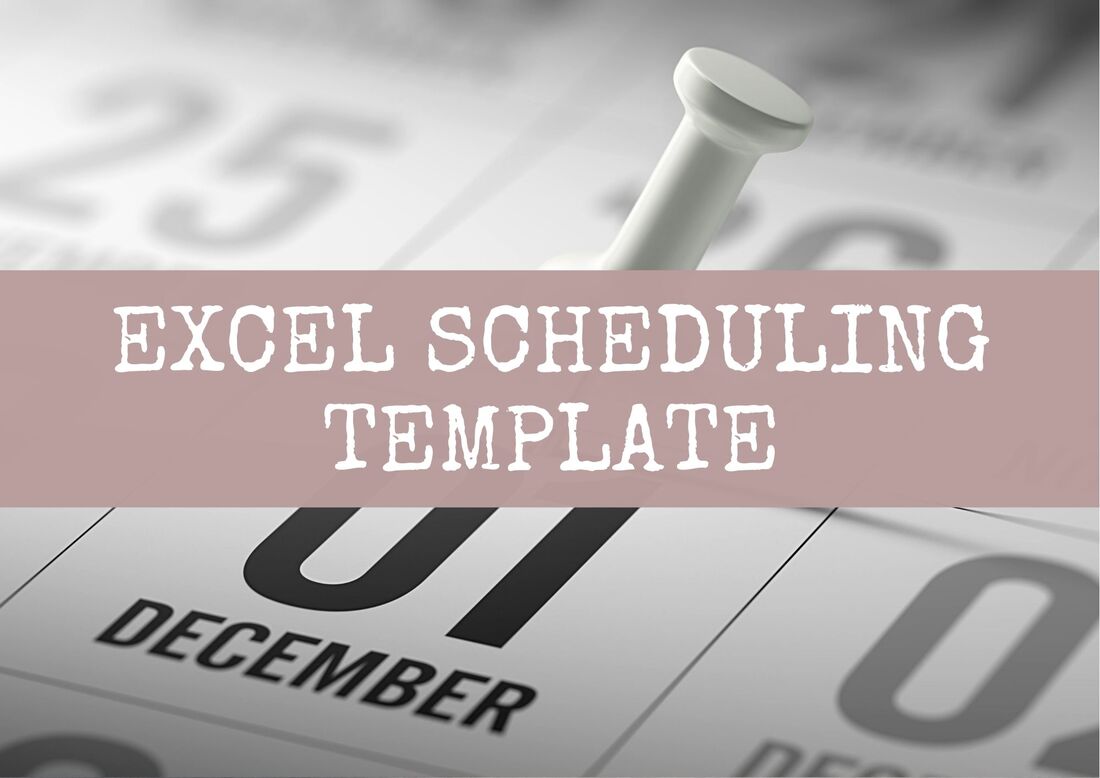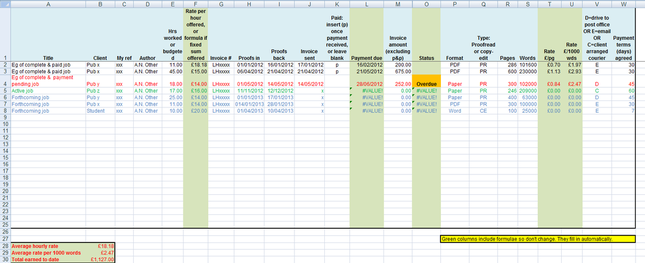|
Accidentally deleted a file or folder? If it's in Dropbox, you can recover it up to 30 days after hitting the delete button.
Think Dropbox is great for cloud-based file-sharing and back-up? It's a business life-saver too.
You can restore any deleted file or folder you'd saved to your Dropbox account. Here's how to do it: Recovering and restoring deleted files or folders on Dropbox. It's a doddle. I put it to the test after a tech-meltdown led to hundreds of precious family photos disappearing from my PC. The're safe and sound and the recovery process took under a minute.
Louise Harnby is a line editor, copyeditor and proofreader who specializes in working with crime, mystery, suspense and thriller writers.
She is an Advanced Professional Member of the Chartered Institute of Editing and Proofreading (CIEP), a member of ACES, a Partner Member of The Alliance of Independent Authors (ALLi), and co-hosts The Editing Podcast. Visit her business website at Louise Harnby | Fiction Editor & Proofreader, say hello on Twitter at @LouiseHarnby, connect via Facebook and LinkedIn, and check out her books and courses.
1 Comment
If you're looking for an easy and free way to schedule your editing and proofreading projects – clients, income, payment-due dates – this free Excel template is for you.
Keeping track of editing and proofreading projects is essential for every professional editor.
Download this free Excel template to get you started. The figures are completely made up but show the basic structure. If you're a newbie, you can use this as an interim way of managing your accounts and your schedule; one less thing to worry about for now! This template includes a number of columns with formulae that I find useful.
I like to differentiate between different stages of the process:
It helps me to see, at a glance, what's going on in my schedule, especially when a client asks about availability. I also track how the job will be returned to a client: via email, the post office or courier (at the client's expense). The UK's HMRC allows the freelancer to offset a percentage of mileage costs against their tax liabilities. There's a summary box at the bottom of the spreadsheet. This shows me my average earnings, my average hourly rate and my average rate per 1,000 words. These figures are really only for curiosity, since each job varies quite considerably in size, type, budget, difficulty and speed. If I was doing any serious analysis I'd look more deeply into the data to assess whether there are patterns in terms of, say, client type, service offered and subject matter. Still, it's useful for grabbing quick-and-dirty data for annual comparisons. Feel free to copy, amend or ignore as you see fit. You can add your own formulae to particular columns if the way in which you charge for your work differs.
Louise Harnby is a line editor, copyeditor and proofreader who specializes in working with crime, mystery, suspense and thriller writers.
She is an Advanced Professional Member of the Chartered Institute of Editing and Proofreading (CIEP), a member of ACES, a Partner Member of The Alliance of Independent Authors (ALLi), and co-hosts The Editing Podcast. Visit her business website at Louise Harnby | Fiction Editor & Proofreader, say hello on Twitter at @LouiseHarnby, connect via Facebook and LinkedIn, and check out her books and courses. A note from Louise: Do you issue a contract before you start an editorial project? If not, take a gander at the advice from my editorial colleague Cassie Armstrong. Working without a net Most of you wouldn't think of beginning an editing project, or making a major purchase, without a contract in place. I was like that, too. I never began a new project without either a signed contract on file or an email where both parties made it clear what they would and would not do. But I didn't do that with a recent project. That mistake cost me time and money. Take a minute and learn from my mistake. I answered a job post for a proofreader a few weeks ago. The project was interesting, so I sent an email to the person who posted it. We talked about what the work involved, why a proofreader was needed, and about my hourly fees. I was thrilled to be accepted because the project piqued my interest. I could relate. But in my haste to begin, I didn't take the time to discuss a contract with my client. I should have stopped right there and corrected this mistake. Ask if there’s a budget In the early talking stages, when you and your potential client are discussing the project, take the time to ask if there is a budget for the work. I usually always ask. If I like the project and want to be involved, I will often times accept it even if the potential client’s budget is lower than my hourly fee. That decision is up to you, but it’s one that you need to consider in the beginning talking stages for any project. Money isn’t the only reason to be involved. In the recent project I suggested an hourly fee but didn't ask about a budget. For the next piece of work, I plan to avoid this mistake and ask the question. It would be in your best interest to ask the question, too. Remember to ask it during the project’s conversational phase, before you accept job. Don’t do anything without a contract I didn’t suggest or push for a contract because my client wanted the project completed in a week. I thought requesting a contract would slow down the process. This was my third mistake. Always take the time to draw up a contract. If you don’t want to be that formal, you can write the potential client a letter that explains what you will do and how you will do it. The letter and contract don’t have to be complicated and KOK Edit has some good examples that you can review and modify to suit your needs in her Copyeditors’ Knowledge Base (Contract between editor and book publisher; Contract between editor and client). An email will also serve as a contract If you don’t want to draw up a formal contract and take the time needed for both parties to sign it and return it, an email where you specify what you will do, how long the project will take, and the overall or hourly fee will also suffice as long as you have a statement of agreement from your client in a return email. This acceptance email will serve as the contract for the job. Ask for a deposit Just as a contract is important in any project, so is a deposit. Depending on the length of the project, you may want up to 50 per cent in advance and payment on billable hours every two weeks. The amount of deposit as well as the project’s billing cycle is as individual as the project and editor. These items should also be spelled out in the contract. For some small projects, I have edited without a deposit. For me, it’s a gut reaction. Just as each contract is different, so is requiring a deposit. For short projects with rapid turnarounds, deposits may not work. Do what works for you and is best for your circumstances at the time. In all cases, make sure you have complete contact information and consider using PayPal. Add a kill fee No matter what kind of contract you write, either traditional, a letter or email, make sure the contract contains a kill fee. The kill fee will save you a lot of grief and will provide an out for both you and your client if things don’t progress the way you'd planned. Just as a deposit helps protect you from doing a lot of work and then not getting paid for it, a kill fee, cancellation fee, or rejection fee serves a similar purpose. The kill fee ensures that you’re paid for all the work you’ve done up to the time the client notifies you that they are not going to work with you any longer, or when you decide to walk away from the project for one reason or another. Both you and the client may decide to cancel the project for any number of reasons, including timing, money, or change of focus. You both may decide to cancel the job because you aren't happy with the initial work, may think that you aren't working well together, or may not want to continue for some other reason. Whatever the grounds, the kill fee helps cover your billable time and any tangible expenses (delivery fees, for example) incurred so far in the project. Make sure you understand what the project entails Through conversations and drafts, make sure that the project requirements are crystal clear for all parties involved.
Offer to fix any errors If you make a mistake in a project because of a lack of communication or because the client is not happy with one aspect of your work, offer to fix the problem. Taking a few hours to make a client happy will be your best reward in the long run. It will make you feel good and there’s also the possibility of receiving future work from a satisfied customer. Keep the lines of communication open Communication in a project is key. You can communicate via email or via the telephone. Establish the best way to keep in touch before the project begins and discuss how many times a week you will be in contact. If the client prefers telephone conversations, exchange numbers. Ask when the best time to talk is and keep in mind any different time zones between you both. Keep all conversations brief and on point. Be courteous but businesslike. Don’t allow yourself to be bullied If you find yourself in the position where you’re doing more than the contract specified, take a minute and regroup. Go over the contract specifics. Make sure to review the specifics and discuss the new project requirements with your client. Explain that the new requirements will take more time and will cost more than the original fee. Offer to fulfil the new requirements for an additional fee and specify how this will be paid. Keep all conversations light but remain in control. Don’t allow yourself to be pushed into doing something that you’re not comfortable with or making changes that weren’t discussed previously. If you have to make changes or correct an error, don’t allow the client to deduct the cost of these changes from the original project fee. Explain your position to your client and stand your ground. Standing your ground is something that many of us aren't comfortable with. However, in business, and real life, it’s necessary if you don’t want to be bullied. If a situation like this occurs early on in the project, the kill fee you included in the contract, letter, or email will come in handy. Use it and walk away. Never put yourself in a situation where you are not in control or where you have second thoughts about a client or project. It isn't worth it. Bottom line Bottom line: a well-designed contract should avoid any potential problems in a project. Before I begin another project, either with an individual or with a publisher, I plan to make sure that the job specifics are spelled out and crystal clear. I will also add a kill fee to the contract and if there’s an inkling that the project is not going well, I will walk away. Copyright 2012 Cassie Armstrong Cassie Armstrong is a professional editor and the founder of MorningStar Editing. She's a recovering college English teacher and member of the Editorial Freelancers Association with over six years' editing experience. Her clients are primarily individual authors and trade publishers who specialize in fiction and non-fiction subjects, from biographies to YA novels. Cassie enjoys working with yarn and thread in her spare time and is developing a complementary speciality in editing books about crafting. Contact Cassie via her website MorningStar Editing, Twitter @MorningStarEdit, and LinkedIn. |
BLOG ALERTSIf you'd like me to email you when a new blog post is available, sign up for blog alerts!
TESTIMONIALSDare Rogers'Louise uses her expertise to hone a story until it's razor sharp, while still allowing the author’s voice to remain dominant.'Jeff Carson'I wholeheartedly recommend her services ... Just don’t hire her when I need her.'J B Turner'Sincere thanks for a beautiful and elegant piece of work. First class.'Ayshe Gemedzhy'What makes her stand out and shine is her ability to immerse herself in your story.'Salt Publishing'A million thanks – your mark-up is perfect, as always.'CATEGORIES
All
ARCHIVES
July 2024
|
|
|
|




















 RSS Feed
RSS Feed





